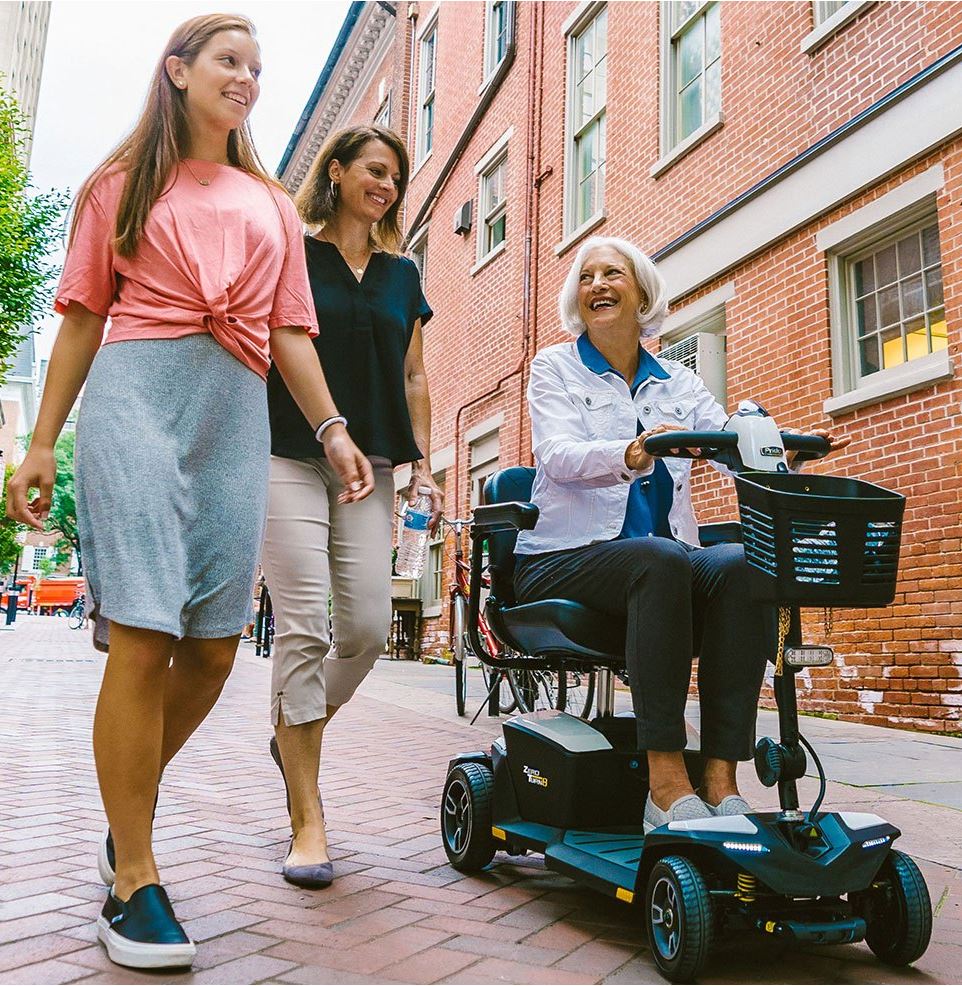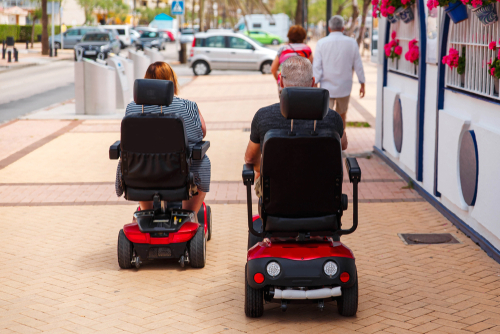Medicare may cover the cost of a mobility scooter if it is considered medically necessary. This means that the individual must have a medical condition that impairs their ability to walk, and the scooter must be prescribed by a doctor.
Additionally, the scooter must be used primarily for indoor purposes. However, Medicare will not cover scooters solely for recreational or outdoor use. It is important to consult with a healthcare professional and check with Medicare to determine if a mobility scooter is covered under specific circumstances.

Credit: tritonmedical.net
Medicare Coverage For Mobility Scooters
For individuals with limited mobility, having a mobility scooter can make a world of difference in their daily lives. These scooters provide independence and freedom, allowing individuals to move around with ease. If you are wondering whether Medicare will cover the cost of a mobility scooter, it’s important to understand the criteria for coverage, the types of mobility scooters covered, the documentation required, as well as any limits and restrictions.
Criteria For Coverage
Medicare has specific criteria that determine whether they will cover the cost of a mobility scooter. To be eligible, you must have a medical need for the scooter, meaning that it must be necessary for you to perform daily living activities in your home. Medicare considers factors such as your ability to use a cane, walker, or manually operated wheelchair. If these devices are not sufficient to meet your mobility needs, a mobility scooter may be deemed medically necessary.
Types Of Mobility Scooters Covered
Medicare will cover various types of mobility scooters as long as they meet the necessary requirements. These typically include three or four-wheeled scooters that are designed for both indoor and outdoor use. Medicare may also cover scooters with additional features such as lights, baskets, or other accessories that enhance the functionality and safety of the device.
Documentation Required
When seeking Medicare coverage for a mobility scooter, certain documentation is necessary. You will need to provide a written prescription from a healthcare provider, stating that a mobility scooter is medically necessary for you. Additionally, you may need to submit a Certificate of Medical Necessity (CMN) or a Detailed Written Order (DWO) from your healthcare provider. These documents outline the specific features and specifications required for the scooter to meet your mobility needs.
Limits And Restrictions
While Medicare does offer coverage for mobility scooters, it’s important to be aware of any limits and restrictions that may apply. Medicare may only cover a portion of the cost, leaving you responsible for a certain percentage or copayment. Additionally, there may be limitations on the frequency of coverage, meaning that you may not be eligible for a new scooter if you have received one within a certain timeframe.
It’s crucial to familiarize yourself with Medicare’s guidelines and consult with your healthcare provider to determine your eligibility and coverage options for a mobility scooter. Understanding the criteria for coverage, the types of scooters covered, the documentation required, as well as any limits and restrictions, will help you navigate the process more effectively and make an informed decision.

Credit: www.oklahoman.com
How To Qualify For A Mobility Scooter
Qualifying for a mobility scooter through Medicare can greatly improve the mobility and independence of individuals with limited mobility. To determine eligibility, it is important to understand the various requirements and allowances provided by Medicare. The following sections outline the eligibility requirements, enhanced allowance, DLA and PIP payments, and armed forces related payment.
Eligibility Requirements
Medicare provides coverage for mobility scooters as durable medical equipment (DME) under Part B (Medical Insurance). In order to qualify for a mobility scooter, you must meet specific eligibility requirements:
- Medical Necessity: The mobility scooter must be medically necessary for you to perform daily living activities.
- Physical Limitations: You must have a physical limitation that impairs your ability to walk and move around without assistance.
- Prescription: A prescription from a healthcare professional, such as a doctor or physical therapist, is required to verify the medical necessity of a mobility scooter.
- Prior Authorization: Medicare may require prior authorization for power wheelchairs and scooters.
Enhanced Allowance
One way to qualify for a mobility scooter through Medicare is by receiving the enhanced allowance on either Disability Living Allowance (DLA) or Personal Independence Payment (PIP). The Enhanced Rate for DLA or the Enhanced Daily Living Component for PIP indicates a higher level of disability and increased need for mobility assistance.
Dla And Pip Payments
DLA and PIP benefits are categorized into two rates: the Standard Rate and the Enhanced Rate. To be eligible for the Motability leasing packages, you must be receiving the enhanced allowance rate on either DLA or PIP payments. These payments serve as an indication of the severity of your mobility limitations and the need for a mobility scooter.
Armed Forces Related Payment
In addition to the enhanced allowance on DLA or PIP payments, individuals receiving armed forces related payment may also qualify for a mobility scooter through Medicare. This includes payments such as War Pensioners’ Mobility Supplement (WPMS) and Armed Forces Independence Payment (AFIP). The armed forces related payment serves as a recognition of the unique mobility challenges faced by individuals who have served in the armed forces.
By meeting the eligibility requirements, receiving the enhanced allowance, or receiving an armed forces related payment, you can qualify for a mobility scooter through Medicare. It is essential to consult with a healthcare professional and understand the specific guidelines and documentation required by Medicare to ensure a smooth process and successful approval for a mobility scooter.
Other Options For Financing Mobility Scooters
While Medicare may provide coverage for mobility scooters in certain cases, it is important to explore other options for financing if you do not meet the specific requirements. Here are some alternative avenues to consider:
Private Insurance
If you have private health insurance, it is worth checking with your provider to see if they cover the cost of mobility scooters. Some insurance plans may offer partial or full coverage, depending on your policy. Contact your insurance company directly to inquire about their coverage options for assistive devices like mobility scooters.
Out-of-pocket Payments
If insurance coverage is not available or does not fully cover the cost, you may need to consider paying for the mobility scooter out of pocket. While this can be a significant expense, it gives you the freedom to choose the specific scooter that meets your needs and preferences. Saving up for the purchase or setting up a payment plan with the scooter provider can help make this option more manageable.
Financial Assistance Programs
Various financial assistance programs exist to provide support for individuals in need of mobility equipment. Programs like Medicaid or the Veterans Administration can help cover the cost of mobility scooters for eligible individuals. Additionally, state and local organizations may offer assistance programs based on income or disability status. Research and inquire about these programs to see if you qualify for financial aid.
Charitable Organizations
In some cases, charitable organizations may provide grants or donations to assist individuals in obtaining mobility scooters. These organizations often have specific criteria for eligibility, so it is important to research and apply to those that align with your circumstances. Foundations, community organizations, and charities dedicated to supporting individuals with disabilities are good places to start.
When considering which financing option is best for you, it is essential to weigh the cost, eligibility criteria, and any limitations or restrictions that may come with each option. Consulting with healthcare professionals, financial advisors, and social workers can help guide you toward the most suitable solution.
Frequently Asked Questions For Will Medicare Pay For A Mobility Scooter
Does Medicare Pay Anything On A Scooter?
Yes, Medicare does provide coverage for scooters under its wheelchair and scooter benefit.
How Long Does It Take Medicare To Approve A Mobility Scooter?
Medicare approval for a mobility scooter can vary, but it typically takes a few weeks to a few months.
Do I Qualify For A Mobility Scooter?
To qualify for a mobility scooter, you must be receiving the enhanced allowance on either DLA or PIP payments, or be receiving an armed forces related payment. Medicare may cover a mobility scooter if it is deemed medically necessary for daily living activities that cannot be performed using other mobility aids.
Will Medicare Pay For A Hoveround?
Medicare will cover a hoveround if it is medically necessary for performing daily activities at home that cannot be done with a cane, walker, manual wheelchair, or mobility scooter. Medicare Part B (Medical Insurance) covers power-operated vehicles like scooters as durable medical equipment (DME).
Conclusion
Medicare coverage for mobility scooters can be a valuable resource for individuals with mobility issues. Medicare Part B covers power-operated vehicles like scooters as durable medical equipment (DME). However, it is important to note that Medicare has specific criteria for coverage, including medical necessity and eligibility requirements.
To determine if Medicare will pay for a mobility scooter, it is recommended to consult with a healthcare professional and contact Medicare directly for guidance. Understanding the guidelines and requirements can help individuals make informed decisions about their mobility needs.

